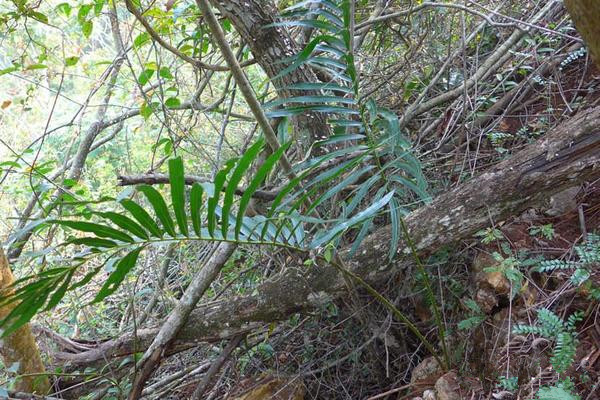
Honghe Cycad Nature Reserve in Gejiu City, Honghe
Overview
The Honghe Cycad Nature Reserve (红河苏铁自然保护区) is located in the southeastern part of Honghe Hani and Yi Autonomous Prefecture (红河哈尼族彝族自治州) in Yunnan Province, China. The geographical coordinates are 103°22′49″E to 103°28′19″E and 22°59′48″N to 23°4′05″N. It is situated on the northern bank of the Yuanjiang River (referred to as the Honghe River in Honghe Prefecture) in the central section, bordered by Gejiu City (个旧市), Mengzi County (蒙自县), Pingbian Miao Autonomous County (屏边苗族自治县), and Hekou County (河口县). The reserve has an intended area of 31.95 square kilometers.
Attractions and Highlights
The Honghe Cycad Nature Reserve is primarily dedicated to the protection of rare plants such as cycads, Dongzong palm (董棕), and Camellia reticulata (金花茶) along the banks of the Honghe River. The most precious among them is the Honghe cycad (红河苏铁), which has garnered enough significance that the Postal Department issued a commemorative stamp in its honor.
Recent Natural Phenomena
Recently, five Honghe cycads (两雌三雄) located in the Baohe Township (保和乡) of Gejiu City simultaneously bloomed, creating a rare sight. These cycads, which grow on cliff faces, showcased their impressive flower clusters.
- Female Flowers: The female flowers are golden yellow and spherical, resembling large hydrangea blooms atop the tree.
- Male Flowers: The male flowers are also golden yellow and shaped like pagodas, with a texture reminiscent of pineapple skin, arranged in a scale-like pattern among the green feather-like leaves.
Cycads are known as the oldest seed plants still existing on Earth and are often referred to as “living fossils.” The Honghe cycad, unique to the Dawa Mountain National Nature Reserve (云南大围山国家级自然保护区), is also known as the gray dry cycad (灰干苏铁) or fine-leaved cycad (细叶苏铁).
Conservation Efforts
With fewer than 1,000 individuals found globally, the Honghe cycad is considered the “giant panda” of the plant world. Li Wenqing (李文清), the director of the Gejiu Management Station in the Dawa Mountain National Nature Reserve, and his team monitor and document the growth environments and conditions of each cycad daily.
Due to the dioecious nature of cycads, if the male and female flowers bloom in different seasons or are too far apart, natural pollination becomes difficult. Therefore, the staff closely monitor blooming times, collect seeds for artificial breeding, and have successfully returned over 500 cycad seedlings to their natural habitat.
Ecological Impact
The successful flowering of the cycads symbolizes the positive results of wildlife conservation in Gejiu City. In recent years, the city has implemented comprehensive protective measures, resulting in clearer skies, cleaner waters, and greener mountains. Plans are underway to expand cycad populations and continue safeguarding biodiversity.
How to Get There
The Honghe Cycad Nature Reserve is accessible from Gejiu City. You can take a taxi or a local bus to reach the reserve. If driving, follow local signage to the reserve entrance.
Travel Tips
- Best Time to Visit: The blooming season of cycads typically occurs in the spring; visiting during this time will provide the best chance to witness the flowering phenomenon.
- Guided Tours: Consider joining a guided tour for a more informative experience about the flora and fauna of the reserve.
- Respect the Environment: Maintain a respectful distance from the plants and wildlife, and follow all conservation rules to help protect this unique ecosystem.
- Photography: Bring a camera to capture the stunning scenery and unique flowers, but ensure to respect the reserve’s guidelines on photography.
By visiting the Honghe Cycad Nature Reserve, you will not only enjoy the beauty of rare plants but also contribute to the ongoing efforts to preserve biodiversity in this unique ecological zone.


















